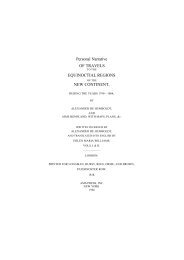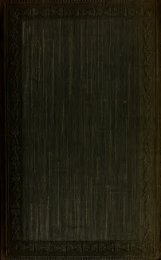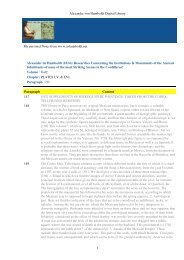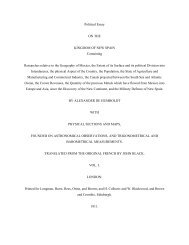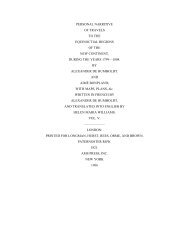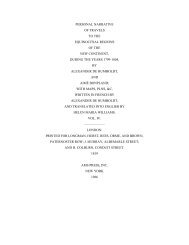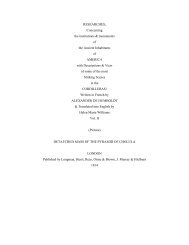See the complete document here
See the complete document here
See the complete document here
You also want an ePaper? Increase the reach of your titles
YUMPU automatically turns print PDFs into web optimized ePapers that Google loves.
NArUKAL DESCRIPTIONS IN THE PERSIAN WFaTERS. 5^<br />
often heavy and overcharg-ed with artificial adornment. If,<br />
in accordance with <strong>the</strong> opinion of <strong>the</strong> Persians <strong>the</strong>mselves,<br />
we award <strong>the</strong> highest praise to that which we may designate<br />
by <strong>the</strong> terms spirit and wit, we must limit our admiration to<br />
<strong>the</strong> productiveness of <strong>the</strong> Persian poets, and to <strong>the</strong> infinite di-<br />
versity of forms imparted to <strong>the</strong> materials which <strong>the</strong>y employ ;<br />
depth and earnestness of feelmg are wholly absent from <strong>the</strong>ir<br />
writings.*<br />
Descriptions of natural scenery do but rarely interrupt <strong>the</strong><br />
narrative in <strong>the</strong> historical or national Epos of Firdusi. It<br />
seems to me that <strong>the</strong>re is much beauty and local truthfulness<br />
in <strong>the</strong> description of <strong>the</strong> mildness of <strong>the</strong> climate and <strong>the</strong> force<br />
of <strong>the</strong> vegetation, extolled in <strong>the</strong> praise of <strong>the</strong> coast-land of<br />
Mazanderan, which is put into <strong>the</strong> mouth of a wandering<br />
bard. The king, Kei Kawus, is represented as being excited<br />
by this praise to enter upon an expedition to <strong>the</strong> Caspian Sea,<br />
and even to attempt a new conquest.! The poems on Spring<br />
by Enweri, Dschelaleddin Rumi is (who esteemed <strong>the</strong> greatest<br />
mystic poet of <strong>the</strong> East), Adhad, and <strong>the</strong> half-Indian Feisi,<br />
generally brea<strong>the</strong> a tone of freshness and life, although a petty<br />
striving to play on words not unfrequently jars unpleasantly<br />
on <strong>the</strong> senses. $ As Joseph von Hammer has remarked, in<br />
his great work on <strong>the</strong> history of Persian poetry, Sadi, in his<br />
Bosta7i and Gulistan (Fruit and Rose Gardens), may be regarded<br />
as indicating an age of ethical teaching, while Hafiz.<br />
whose joyous views of life have caused him to be compared<br />
to Horace, may be considered by his love-songs as <strong>the</strong> type of<br />
a high development of lyrical art ; but that, in both, bom-<br />
bastic affectation too frequently mars <strong>the</strong> descriptions of nature.^<br />
The darling subject of Persian poetry, <strong>the</strong> "loves of<br />
* Go<strong>the</strong>, in his Commentar zum wesi-ustliclicn Divati, bd. vi., 1828,<br />
*-73, 78, and 111.<br />
t <strong>See</strong> Le Livre des Rois, publie par Jules Molil, t. i., 1828, p. 487.<br />
X <strong>See</strong> Jos. vou Hammer, Gesch. der schonen Redekunste Persiens,<br />
1818, s. 96, coucerniug Ewhadeddiii Enweri, who lived in <strong>the</strong> twelfth<br />
ientury, and in whose poem on <strong>the</strong> Schedschai a remarkable allusion<br />
tias been discovered to <strong>the</strong> mutual attraction of <strong>the</strong> heavenly bodies ; s.<br />
183, concerning Dschelaleddin Rumi, <strong>the</strong> mystic; s. 259, concerning<br />
Dschelaleddin Ahdad ; and s. 403, concerning Feisi, who stood forth at<br />
<strong>the</strong> court of Akbar as a defender of <strong>the</strong> religion of Brahma, and in whose<br />
Ghazulg <strong>the</strong>re brea<strong>the</strong>s an Indian tenderness of feeling.<br />
$ ''<br />
Night comes on when <strong>the</strong> ink-bottle of heaven is overturned," is<br />
ihe inelegant expression of Chodschah Abduiia Wassaf, a poet who has,<br />
however, <strong>the</strong> merit of having been <strong>the</strong> first to describe <strong>the</strong> great astronomical<br />
observatory of Meragha, with its lofty gnomon. Hilali, of<br />
Asterabad, makes <strong>the</strong> disk of tlie moon glow with heat, and regard*




